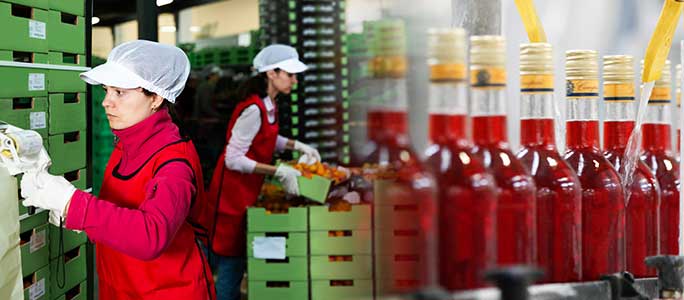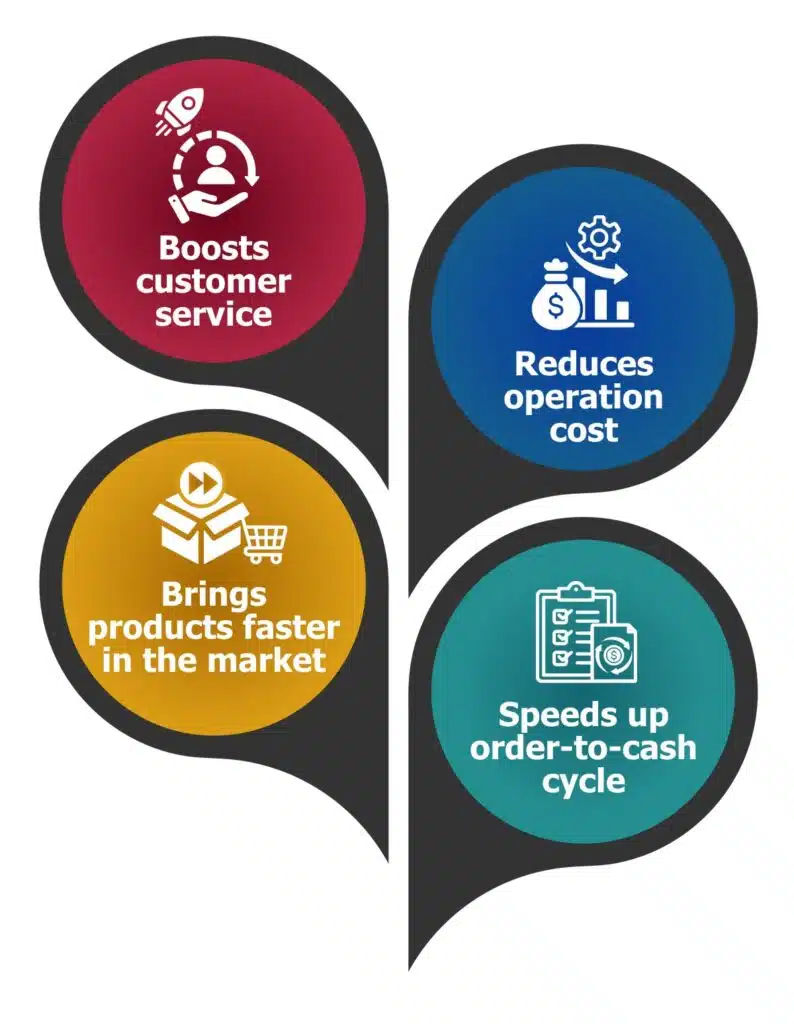
Have you ever pondered why your go-to snack is often out of stock, while your partner’s favourite cookies are consistently available not only in major stores, but also in nearby shops?
The answer lies in the intricacies of Supply Chain Management in food manufacturing. While your favourite snack brand is struggling to decode the secrets of how to maintain a seamless supply chain, the cookies brand has already nailed it.
A food brand always aspires to be in the constant wish-list and reach-list (available) of its consumers. To be in the wish-list of customers, it must provide quality product. To be available any time, it must streamline its supply chain, which is tricky.
But don’t worry, through this blog, we will try to unfold the mysteries behind food supply chain management and find out ways to streamline it.
This blog will guide you through the strategies to make a robust food supply chain. Follow the blog till the end.
Table of Contents:
- What is the Food Supply Chain?
- Working of the Food Supply Chain
- What Makes Food Supply Chain Different From Other Supply Chains?
- What is Food Supply Chain Management?
- What are the Objectives of Food Supply Chain Management?
- Importance of Food Supply Chain Management
- What are the Challenges in Food Supply Chain Management?
- Which is an Effective Food Supply Chain Management Software?
What is the Food Supply Chain?
Food supply chain is a series of processes and stages which determine the flow of material from field to fork. It means food chain encompasses every stage from raw food to its consumption and in between.
With change in time, food supply chain has become more diverse yet interdependent. There are a lot of food manufacturers who procure their raw materials from different parts of the World, process them at different parts, package them and distribute them at various locations.
No matter how complex, but manufacturers must ensure that the food supply chain is intact and deliver quality product to the end user continually without jerks. This requires speed, efficiency, and accuracy of food supply chain, which we will discuss more in the later section of this blog.
Working of Food Supply Chain:
Any food and beverage that you can consider, goes through various stages of the supply chain to reach you. There are some generic food stages of the food supply chain, which are as below:
Production–
This is the stage where raw material is sourced. Either grown or produced, the raw material is prepared in compliance to various local and international laws and regulations to ensure quality and standards.
Handling and Storage–
This is the step where food is harvested and taken through various steps like cleaning, washing, and packing for storage. At this stage, some food material is directly packed and transported whereas, some are sent for further processing.
Processing and packaging–
At this stage, food whether from plants or from animals, are converted into edible form. Raw material converted into consumable form. Here, food manufacturer ensure that food is compliant with various national and international laws before it goes out for sale.
Distribution and retail–
At this stage the edible food is transported and distributed to retailers and dealers.
Consumption–
This is the last stage of food supply chain. At this stage food is consumed by consumers. An effective supply chain decreases transit time and enhances customer service and saves money.
An effective supply chain decreases transit time and enhances customer service and saves money.
What Makes Food Supply Chain Different From Other Supply Chains?
On micro level there are various factors that sets food supply chain apart from other supply chain. But broadly these differences are due to following factors:
Perishability –
Food items are perishable, and this is the biggest differentiator. Perishability of food demands tighter control over storing, transit, and consumption as the time frame from production to consumption is limited.
Besides, the food supply chain is susceptible to weather, moisture, and various other factors. This makes handling food supply chain trickier and more complex.
Food cold chain–
Managing frozen food logistics is more complex. This is because along with various complexities a food supply chain inherit, food cold chain possesses temperature control also. A vigilant supply chain management is a must to manage food cold chain.
Food safety–
Unlike various other supply chains, food has a widespread impact on consumers. Therefore, food safety comes automatically without saying. Food supply chain must adhere to various food safety and compliance norms.
What is Food Supply Chain Management?
Food supply chain management is a system that helps manufacturers to streamline and handle complete food process – from raw material procurement to the delivery of finished good- seamlessly.
Effective food supply chain management aims to optimize efficiency, reduce waste, enhance traceability, and ensure the availability of safe and high-quality food products for consumers. It also addresses challenges such as perishability, seasonal variations, and compliance with food safety regulations.
In recent years, technology, data analytics, and sustainability considerations have played an increasingly crucial role in advancing food supply chain management practices.
More and more food manufacturers have come to realize that managing the food supply chain through manual and spreadsheet-based methods is challenging and less efficient due to the complexity of processes, potential for errors, and difficulty in real-time tracking.
What are the Objectives of Food Supply Chain Management?
Below are some objectives of food supply chain management:
- To ensure quality and safety compliances are met.
- To keep costs as low as possible throughout the supply chain by resolving issues faster.
- To reduce delays and issues among various departments by improving communication, visibility, and transparency.
- To optimize inventory level.
Importance of Food Supply Chain Management
Any supply chain management ensures seamless supply of products to the consumer market. Food supply chain management is crucial because it relates directly to masses. There are many reasons why food supply chain management is important, some of which are:

Boosts customer service–
Customer expects right product at his/her doorstep at the right time. Added to this, they expect only fresh and quality food products. With managed supply chain, manufacturers can ensure delivery of fresh and quality products at right time to the right place.
Reduces operation cost–
Managed food supply chain optimizes inventory costs which reduces inventory holding costs. Also, it minimizes wastage.
With proper management and planning, last-minute high-priced buying can be avoided, saving good amount of money.
A well-managed food supply chain is compliant to all norms and regulations. This reduces chances of manufacturers being penalized for any negligence.
Brings products faster in market–
A managed supply chain fosters departmental collaboration within organization, including production, logistics, sales, etc and ensures seamless flow from manufacturing to the market. This enhances customer tenacity over the brand.
Speeds up order-to-cash cycle–
A streamlined food supply chain management ensures swift order pickup, processing, and delivery, resulting in accelerated payment processes. This, in turn, expedites the entire order-to-cash cycle for enhanced operational efficiency.
What are the Challenges in Food Supply Chain Management?
Food supply chain face all the challenges that other supply chains face, but the list of challenges in food supply chain is longer. Here we are highlighting some of the major issues that food supply chain face.
Food safety–
Food industry must follow strict guidelines and rules to ensure that food is safe to consume. There are numerous factors affecting safety and quality of food products, including contamination, spoilage, improper storage condition, inadequate packaging.
Food supply chain managers must ensure that food is transported, stored, and packed in proper hygienic conditions with materials that can keep these food items fresh for longer time.
Supply chain disruption–
Supply chain disruption adversely affects all the businesses, but it hits stronger to food supply chain as it connects with larger set of global people and resources.
There are various known factors like natural disaster, transportation strike, war, or supplier bankruptcies and some unprecedented factors like Covid 19 pandemic that trigger supply chain disruptions and pose challenges.
Sustainability–
Consumers are becoming more and more environmental custodian. That means they have concerns over the effect of products they are consuming on environment. Manufacturers must address this concern of consumers and therefore should innovate and devise methods to incorporate many more sustainable ways of managing supply chain.
Data leakage–
Any cyber-attack could easily manipulate data and affect functioning of the machinery at work. This deviation can cause easy spoilage of food products. As things around the world are becoming digital, such leakages can be avoided.
For example- records of temperature, moisture at which the food product is preserved can be digitally locked. Adding up IoT and robotics help organization to know immediately when the data is tampered and thus take quick action on it.
High supply chain maintenance cost–
This is a common challenge all supply chains face, but the degree at which this challenge impacts food industry is quite higher.
Maintenance cost comprises expenses that ensure right conditions, quality packaging, and efficient transportation. The cost amplifies while dealing with food cold chain and fresh supplies.
Improper flow of information along the food supply chain–
In a supply chain as diverse as that of food, seamless information flow throughout various stages of supply chain is important. Lack of transparency can lead to improper projection, irrationalized buying, and uninformed decisions. The problem steps up with delay in transportation or shipments.
Which is an Effective Food Supply Chain Management Software?
Food supply chain management is not only complex but requires pinpointed measures to manage each stage. Set of fragmented software can delay the process and create loopholes in the overall supply chain which could cost huge amount.
Therefore, as a suggestion, food organizations must have a comprehensive food supply chain management software in place. This software will manage all the stages including R&D and formulation, procurement, planning, production, inventory management, sales quality & compliance and more, efficiently.
To get more hold on the business and on overall supply chain, organizations are suggested to deploy an Enterprise Resource Planning (ERP) software for food industry.
The software not only manages whole supply chain, but also integrates with finance and various departments of manufacturing organization. This integration fosters clarity, transparency, and accuracy in overall business.
BatchMaster ERP for Food is one such ERP software available in the market. With more than 30 years of experience, the software has helped various food industries to navigate through uncertain markets and conditions of food industry and make profits. If you want to discuss BatchMaster ERP for Food at length, please visit BatchMaster.



















